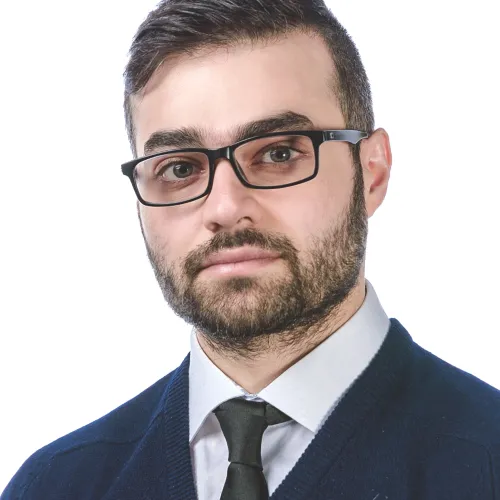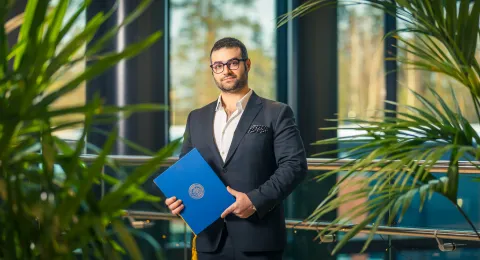On this page
LUT University reached an important milestone in December: its thousandth doctoral graduate. Sina Mortazavi from the LUT School of Business and Management says it is an honor and a privilege for him to be LUT University's thousandth doctor.
"I have truly enjoyed working here. I think LUT is by far one of the best universities in the world – especially for a doctoral student. LUT is among the leading universities in international rankings and an excellent place to grow as a researcher," says Mortazavi.
Mortazavi says he has always wanted an academic career. He now continues his career as a post-doctoral researcher at the LUT School of Business and Management.
"Continuing my work at LUT is an excellent way to make a difference. I can focus on high-level research and education – work that is dear to me. I find it important to teach others what I have learned and conduct meaningful research."
Mortazavi feels an academic career suits those who want to learn something new every day and are passionate about teaching.
"After the public examination of your dissertation you usually know whether you want to continue on the academic career path or whether industry is the way to go. Academic success requires a drive for research. It may be challenging for some because you need to put up with things like rejection from journal publishers."
"I think the research process is very similar to professional sports: you cannot lose your motivation. You need to learn from your failures and pull yourself together to face new challenges."
LUT Doctoral School increases its appeal
In 2021, the LUT Doctoral School admitted more doctoral students than ever before: over 150 in all. On an average, the LUT Doctoral School has admitted 80 doctoral students a year.
Jari Hämäläinen, one of LUT's vice rectors and the head of the doctoral school, says that the growth is a result of changes made last autumn to the application process and LUT's good financial situation. In addition, a number of students from the LAB University of Applied Sciences have signed up to write a doctoral dissertation at LUT. LAB is part of the same university group as LUT University.
Hämäläinen says the growth is real. He states that the number of doctoral graduates has skyrocketed during the university's 53-year history.
"The first public examination of a dissertation was held in 1973, but even as recently as in the 1990s, only about 10 doctoral students graduated from LUT annually. After the turn of the millennium, the number of doctoral graduates grew to 20 a year, which indicates we are on an upward trend," Hämäläinen explains.
Statistics show that the employment rate of LUT's doctoral graduates is high. Hämäläinen is especially happy about the fact that LUT's doctors have found jobs that correspond to their education.
LUT's annual target for doctoral graduates rose when the Ministry of Education and Culture adopted its updated strategy. The future target will be 66 doctorates a year; the previous one was 45 doctorates.
"Collaboration with international universities will help us to achieve this target. More and more dissertations have one supervisor at LUT and another at a university abroad. This will help us to share costs and obtain more visibility on the international research arena."
1000th dissertation deals with sustainable growth in developing countries
Sina Mortazavi's dissertation Mechanisms for fostering inclusive innovation at the base of the pyramid for community empowerment: empirical evidence from public and private sector deals with the role of innovations in generating community growth in developing countries.
Over the course of his dissertation research, Mortazavi identified several challenges encountered by enterprises and determined how inclusive innovation could offer sustainable solutions to them. According to Mortazavi, companies in developing countries need to focus on something more than selling reasonably priced products and services.
"Large and small businesses need to engage with local communities in developing countries and provide growth in those areas by creating jobs and networking with local entrepreneurs. This type of business model is sustainable in the long run," Mortazavi explains.
The primary supervisor of the dissertation was Professor Juha Väätänen (LUT School of Business and Management) and the secondary supervisor was Professor Suraksha Gupta (University of Newcastle). The opponent was Professor Pervez Ghauri (University of Birmingham). Ghauri is a leading expert in international business.
More information:

Seyedsina Mortazavibabaheidari








